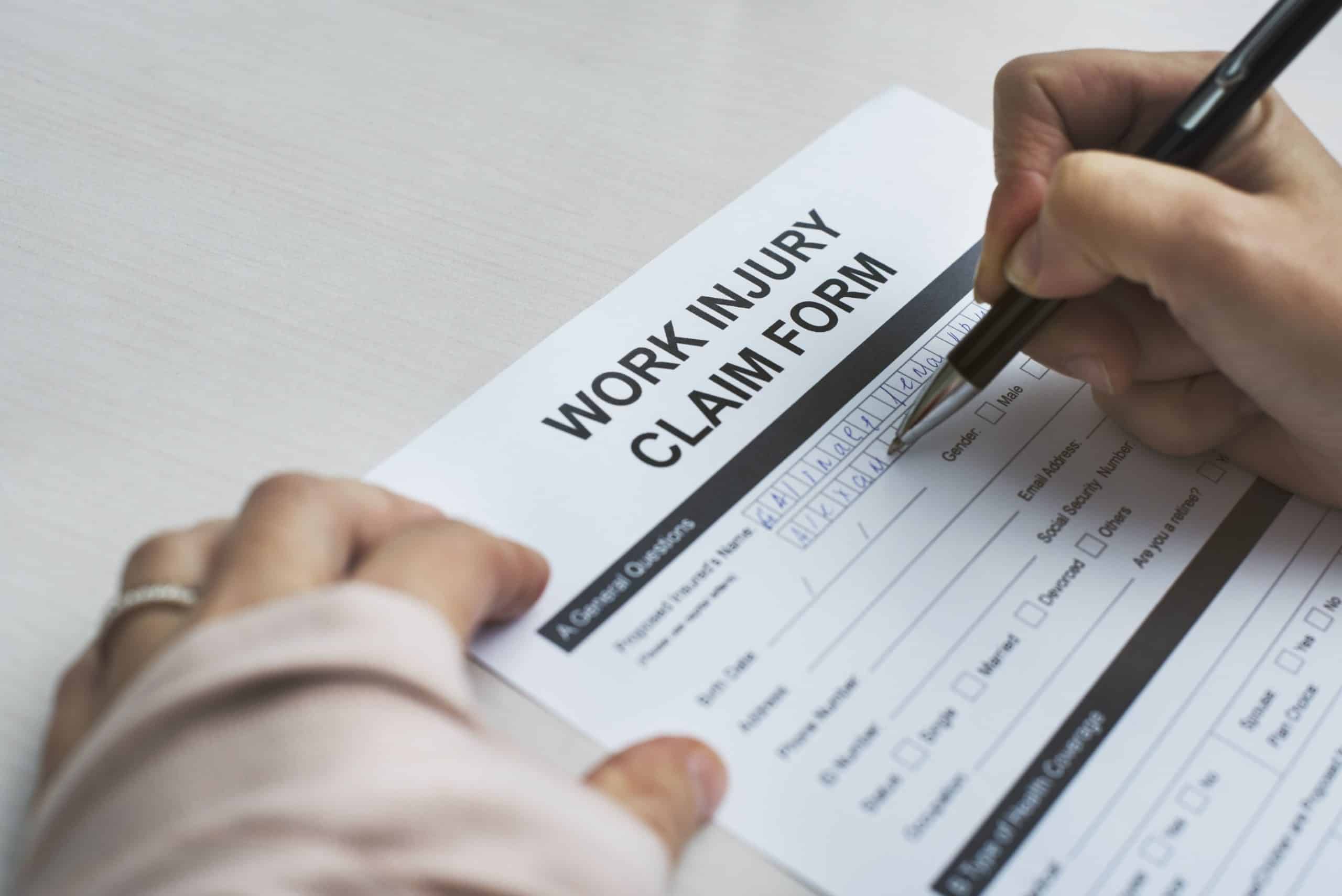Workplace accidents and illnesses can put you in an unfavorable position, facing physical recovery and financial challenges. A workers’ compensation claim can alleviate some of the pressure and help get you back on your feet.
To receive workers’ compensation benefits, you’ll need to file a claim. Workers’ comp claims often come with certain challenges, but a skilled workers’ compensation attorney can provide valuable legal guidance.
What Is Workers’ Compensation?

Workers’ compensation, also referred to as workers’ comp, is a type of insurance many employers must provide for their employees. If an employee is injured at work, they can file a workers’ compensation claim for compensation and benefits.
Each state has its own laws regarding workers’ compensation specifics, including the types of employees covered and how employers must file claims when employees suffer an injury.
It is important to note, however, that one detail remains true in every state: employees who file workers’ compensation claims cannot sue their employers for their injuries. Workers’ comp protects employers from liability, as it is a type of no-fault insurance.
When employees covered by workers’ compensation suffer an injury, usually their only recourse is a workers’ comp claim and ensuing benefits. Still, if a worker’s injuries involve a third party, the employee may have the option of filing a personal injury lawsuit against that party.
After experiencing a workplace accident, it’s best to discuss your situation with a workers’ compensation attorney. A lawyer will gather information to better understand your circumstances and provide legal advice for the best next steps.
What Injuries Does Workers’ Comp Cover?
Workers’ comp insurance covers most injuries, as long as they are work-related. Injuries do not have to result only from accidents; workers’ comp also covers repetitive motion injuries.
Repetitive motion injuries are injuries to a worker’s muscles, ligaments, nerves, or joints that result from performing the same motions at work over and over again.
Additionally, workers’ compensation covers illnesses employees may be diagnosed with if the illness developed due to working conditions.
Workers’ Compensation Benefits
Exact workers’ compensation benefits depend on the state, but typically, workers’ comp covers the following.
Medical Expenses

After a workplace accident, you’ll likely sustain injuries. Between hospital and doctor visits, treatment, and medication, your injuries can quickly become expensive.
Workers’ compensation can help cover the cost of your medical expenses for present and future medical needs.
Lost Wages
Some injuries require employees to take time off of work to heal and recover. Missing time from work can be detrimental financially, as you lose pay as a result.
Workers’ comp can help cover an employee’s lost wages for the time they’re required to take off from work.
Vocational Rehabilitation
Vocational rehabilitation is often necessary for employees after suffering an injury at work.
If a worker is injured or becomes disabled, vocational rehabilitation can help facilitate the employee’s return to work. Vocational rehabilitation encompasses many services depending on an employee’s needs, including vocational assessment, training, and career counseling.
Temporary and Permanent Disability
After suffering an injury at work, it is not uncommon for employees to be left with a disability. Disabilities may be temporary or permanent. Workers’ compensation can help pay for a disabled worker’s medical bills and provide wage replacement.
Funeral and Burial Expenses
In the most unfortunate cases, workplace accidents result in an employee’s death. When an employee passes away due to a work injury or illness, workers’ comp can help the employee’s family with related expenses, including funeral and burial costs.
How Much Compensation For Injury at Work?
The amount of compensation for an injury at work can vary widely depending on several factors, including the severity of the injury, the circumstances of the accident, and the specific workers’ compensation laws in your jurisdiction. Workers’ compensation is a system that provides financial benefits to employees who are injured while on the job. The compensation typically covers medical expenses, lost wages, and, in some cases, rehabilitation costs.
How to File a Workers’ Compensation Claim
If you’re injured at work and would like to receive benefits, you’ll need to file a workers’ compensation claim. The exact process varies by state; therefore, it’s best to speak with a workers’ compensation attorney to ensure you’re taking all necessary steps.
Seek Medical Attention
If you suffer an accident at work and sustain injuries, the very first step you should take is getting medical care. You always want to put your safety and well-being at the forefront.
If you need follow-up care, you may be able to choose your doctor or your employer may provide a list of approved physicians, depending on your state’s workers’ comp rules.
For questions regarding medical care and treating physicians, a workers’ comp attorney can provide answers and guidance.
Report Your Injury or Illness to Your Employer
If you suffer an accident at work that results in injury or receive a diagnosis for a work-related illness, you’ll need to report it to your direct supervisor or employer.
States usually have a specific window of time to report your injury or illness to your employer, but it is commonly within 30 days.
Even if you have weeks to report your injury, the sooner you do so the better. Waiting can have negative effects on your claim. Additionally, the sooner you file your claim, the quicker you can begin to receive workers’ comp benefits.
Report your injury or illness to your employer in writing, if possible, so you can maintain a paper trail.
File a Workers’ Comp Claim
Once you notify your employer, they will either give you forms to fill out or fill out the required forms themselves. They will then submit documentation to their insurance company.
Depending on your state, either your employer will need to file forms with your state’s workers’ compensation agency or you will need to file documents with the agency. A workers’ compensation lawyer can give you valuable guidance to help ensure you file your claim properly and in a timely manner.
What to Expect After Filing Your Workers’ Compensation Claim
After reporting your injury or illness to your employer and filing the appropriate paperwork for your claim, the insurance company can begin its investigation. They will review your documentation, medical records, and any other information to help them make their decision.
Once the insurance company has concluded its investigation, you’ll receive a decision. If the insurer approves your claim, you may begin receiving benefits within a couple of weeks.
If the insurance company denies your claim, you may consider appealing their decision. The appeal process varies by state and can be a daunting process, but a workers’ compensation attorney can help you navigate your claim.
How a Workers’ Compensation Attorney Can Help

While handling your own workers’ compensation claim might appear easy, it is often more challenging than it may seem. You could also encounter bumps in the road, like a claim denial. When you have a workers’ compensation lawyer assisting you with your claim, you can feel calm knowing your claim is in the best hands.
Among the many ways a workers’ comp attorney can help you with your claim, they can do all of the following.
Gather Important Evidence for Your Claim
Evidence can positively impact your workers’ compensation claim. Insurance companies frequently deny claims for insufficient evidence.
A workers’ comp lawyer can obtain evidence to help strengthen your claim, including:
- Medical records
- Doctor’s notes and letters
- Medical opinions from qualified physicians
Depending on your situation, your workers’ comp lawyer will know the evidence your claim needs to help achieve approval.
Handle Your Denial, If Necessary
Workers’ compensation claim denials are unfortunate, but they happen frequently for one reason or another. A workers’ comp attorney can determine the reason why your claim was denied and help correct the issue in hopes of reaching approval.
Appealing a denial can be stressful, and the exact process varies by state agency. Your workers’ compensation lawyer has the experience and skill needed to manage your appeal.
Provide Legal Advice on Potential Third-Party Claims
Just because you cannot sue your employer after suffering an injury or illness at work does not mean you don’t have a case at all. Depending on your circumstances, a third party may be liable for your harm.
A workers’ comp attorney can examine your case and decide whether you have a valid personal injury claim against a third party. If so, your lawyer can also handle your lawsuit to help ensure you get the compensation you deserve for your injuries and other losses.
When to Contact a Workers’ Comp Lawyer
You should contact a workers’ compensation attorney as soon as you’re able after sustaining injuries or receiving a work-related diagnosis.
However, under certain circumstances, you may find it especially important to consult with a workers’ comp lawyer. These situations include the following:
- You suffered severe injuries or your medical condition is particularly serious
- You need to get more medical evidence to support your claim
- Your employer attempts to dispute your claim
- You believe the benefits are not enough, considering your situation
- You receive a denial and must appeal the insurance company’s decision
You don’t have to take on your workers’ compensation claim alone. A qualified workers’ comp lawyer can provide valuable assistance.
After a Work Accident, Speak to a Workers’ Compensation Attorney
Suffering from a work-related injury or illness can negatively affect your life. You likely face physical, mental, and emotional repercussions, while also dealing with financial struggles. If you’ve been harmed by a workplace injury or illness, a worker’s compensation claim can help immensely.
Having a workers’ comp lawyer on your side can make all the difference in the success of your claim. If you need legal assistance with your workers’ compensation claim, contact The Joel Bieber Firm to schedule a complimentary consultation.
Interesting Reads:
What Does a Motorcycle Accident Lawyer Do?
How to File a Claim for Motorcycle Accident Injuries

